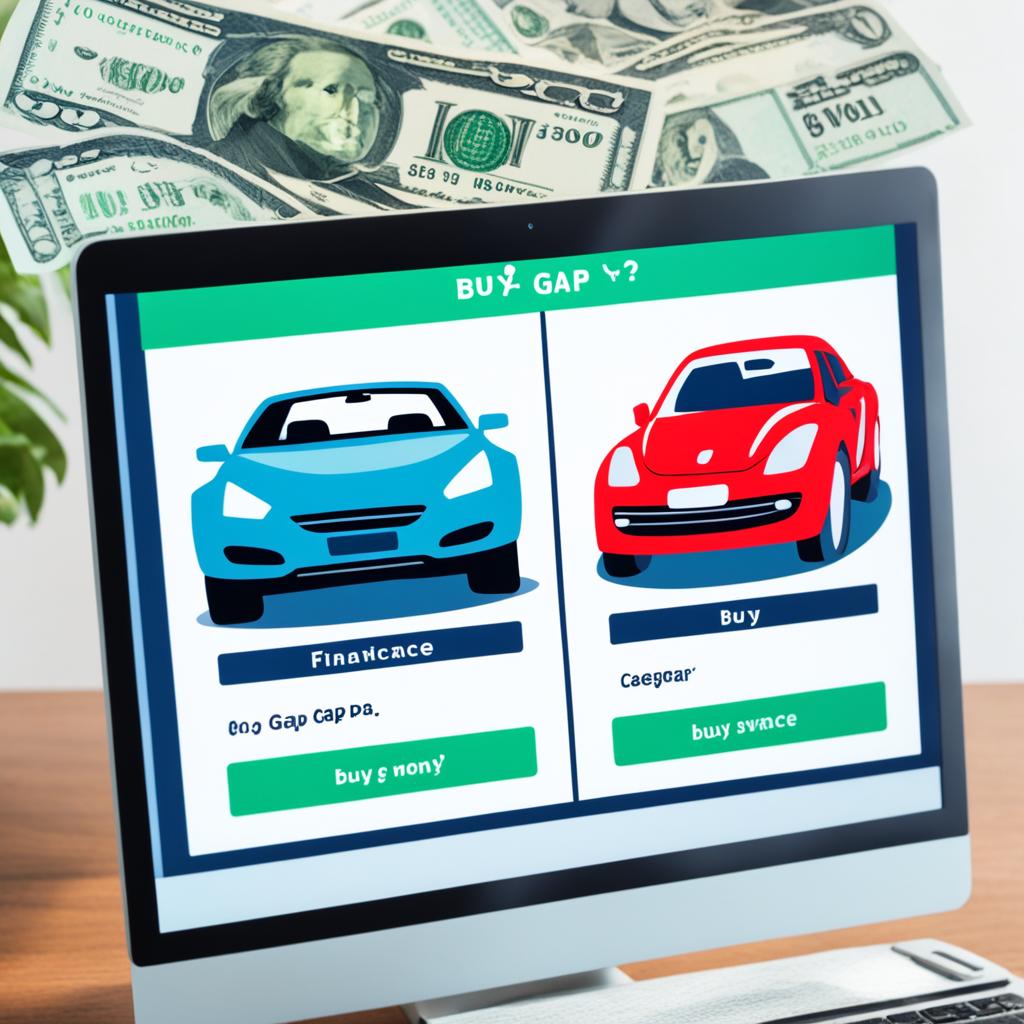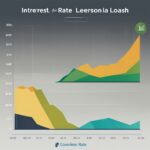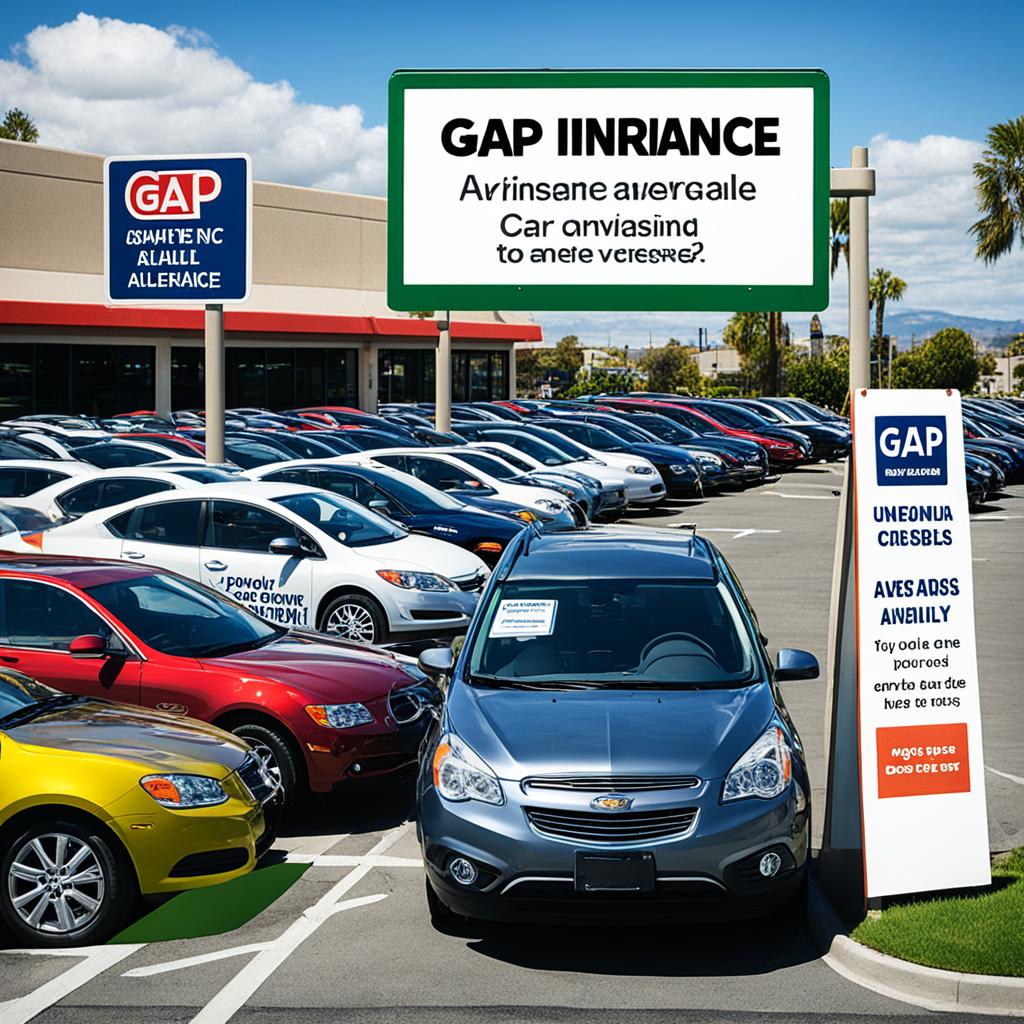Are you looking to protect your auto investment? If you have a financed car, it’s essential to consider gap insurance. Gap insurance is a type of coverage that can protect you in the event of your vehicle being totaled or stolen. It covers the difference between the actual cash value of your vehicle and the amount you still owe on your loan.
But where should you buy gap insurance? In this article, I’ll explore the different options available and help you make an informed decision. After all, you want to ensure you choose a reputable provider and get the best coverage at the most competitive price.
Key Takeaways:
- Gap insurance protects your auto investment by covering the gap between the car’s value and the amount owed on the loan.
- You can buy gap insurance from various sources, including car insurance companies, specialized gap insurance providers, and car dealerships.
- Factors to consider when buying gap insurance include cost, coverage limits, and the reputation of the provider.
- Compare quotes from different providers to ensure you’re getting the best coverage at a competitive price.
- Gap insurance is particularly recommended for those with a small down payment, a long finance period, or a vehicle that depreciates quickly.
What is Gap Insurance?
Gap insurance, also known as loan/lease payoff insurance, is an optional coverage that can help pay off the remaining balance on your auto loan in the event of a total loss or theft. It covers the gap between the actual cash value (ACV) of your vehicle and the amount you owe. Gap insurance is designed to protect you from financial loss by bridging the gap between what your insurance company pays out and what you still owe on your loan.
When you purchase a new car, it starts depreciating as soon as you drive it off the lot. In the event of a total loss, such as a car accident or theft, your insurance company will reimburse you for the ACV of the vehicle. However, the ACV may be significantly lower than what you owe on your loan since cars depreciate quickly. This means you could end up owing more on your loan than the insurance payout, leaving you financially responsible for the difference.
Gap insurance can be a valuable safeguard in these situations. By purchasing gap insurance, you can protect yourself from having to pay out of pocket for the remaining balance on your auto loan. It provides peace of mind and can help you avoid a financial burden in the event of an unfortunate incident with your vehicle.
There are several options available when it comes to choosing a gap insurance provider. You can purchase gap insurance online from various providers, including car insurance companies and specialized gap insurance providers. Shopping for gap insurance online allows you to compare quotes, explore different coverage options, and find a policy that suits your needs.
Why should you consider purchasing gap insurance online?
- Convenience: Purchasing gap insurance online allows you to buy coverage from the comfort of your own home, without the need to visit a physical location or make phone calls.
- Wide choices: When buying gap insurance online, you have access to a wide range of providers, allowing you to compare prices and coverage options to find the best policy for your needs.
- Flexibility: Online providers often offer customizable coverage options, allowing you to tailor your gap insurance policy to fit your specific requirements.
- Competitive prices: Online providers may offer competitive rates due to lower overhead costs compared to traditional brick-and-mortar insurance agencies.
- Transparent information: Online platforms provide detailed information about the coverage offered, policy terms, and any additional benefits, empowering you to make an informed decision.
Overall, purchasing gap insurance online offers convenience, choice, and the opportunity to find an affordable policy that meets your specific needs. It is an efficient way to ensure you have the necessary coverage to protect your auto investment.
Do I Need Gap Insurance?
Whether or not you need gap insurance depends on your individual circumstances. If you have a financed vehicle and the amount you owe on your loan exceeds the value of the car, gap insurance can provide valuable protection. It is particularly recommended for those who have made a small down payment, have a long finance period, drive a lot, or have purchased a vehicle that depreciates quickly. Ultimately, the decision to purchase gap insurance should be based on your personal financial situation and the potential risks involved.
How Does Gap Insurance Work?
Gap insurance is a coverage option that protects you from financial loss in the event that your financed vehicle is totaled or stolen. It works by covering the difference, or “gap,” between the actual cash value (ACV) of your vehicle and the amount you still owe on your loan. By filling this gap, gap insurance ensures that you are not left with a large outstanding balance to pay off.
When you experience a total loss or theft of your vehicle, your insurance company will typically pay you the ACV. However, this amount may not be sufficient to cover the full amount you owe on your loan. This is where gap insurance kicks in.
Gap insurance can be beneficial in several ways:
- It protects you from having to pay out of pocket to cover the remaining loan balance.
- It gives you peace of mind knowing that you are financially protected.
- It allows you to maintain your financial stability and avoid negative consequences, such as damaged credit, from unpaid loan balances.
In order to ensure that you are getting the best coverage at the most affordable price, it is important to compare gap insurance quotes from different providers. Consider factors such as coverage limits, deductibles, and any additional benefits or features offered by each provider. Additionally, it is convenient to choose a gap insurance provider that is located near you, so you can easily access their services when needed.
Comparing Gap Insurance Quotes
When comparing gap insurance quotes, be sure to consider the following:
- Coverage Limits: Different providers may offer different coverage limits. Make sure the coverage amount is sufficient to fill the gap between the ACV and your loan balance.
- Cost: Compare the costs of gap insurance from different providers to ensure you are getting a competitive rate. Keep in mind that the cost may vary based on factors such as the value of your vehicle and the length of your loan.
- Convenience: Choose a provider that is located conveniently near you so that you can easily access their services when needed.
By comparing gap insurance quotes and considering these factors, you can make an informed decision and choose the gap insurance policy that best fits your needs.
Now that you understand how gap insurance works and how to compare quotes, you can confidently protect your auto investment and avoid potential financial burdens in the event of a total loss or theft.
| Benefits of Gap Insurance | Factors to Consider |
|---|---|
| Financial protection against outstanding loan balance | Coverage limits |
| Peace of mind knowing you are protected | Cost of the coverage |
| Maintain financial stability | Reputation of the provider |
Where Can I Buy Gap Insurance?
When it comes to buying gap insurance, you have several options to choose from. Whether you prefer the convenience of purchasing online or would rather buy it through a traditional method, there are various gap insurance providers that can meet your needs. Let’s explore the different avenues for obtaining gap insurance and what factors you should consider in the process.
Car Insurance Companies
One option is to purchase gap insurance directly from car insurance companies. Many insurers offer gap insurance as an add-on to their auto insurance policies, making it convenient to buy it alongside your regular coverage. You can often customize your policy to determine the coverage limits and deductibles that suit your specific situation. To buy gap insurance from a car insurance company, simply reach out to your provider and inquire about their options.
Specialized Gap Insurance Providers
In addition to car insurance companies, there are specialized gap insurance providers that focus specifically on offering gap coverage. These companies specialize in providing comprehensive gap insurance policies that can give you peace of mind and financial protection. By purchasing gap insurance from a specialized provider, you can access policies tailored to fit your needs and receive expert assistance throughout the process.
Car Dealerships
When purchasing a vehicle, you can often buy gap insurance directly from the car dealership. This can be a convenient option, especially if you’re financing your car through the dealership. Car dealerships typically work with insurance partners and can offer gap insurance as part of your financing package. If you’re considering this option, make sure to carefully review the terms and conditions to ensure the coverage meets your requirements.
Before making a decision on where to buy gap insurance, consider the following:
- Cost: Compare the prices offered by different providers to ensure you are getting a competitive rate.
- Coverage Options: Evaluate the coverage limits and additional benefits provided by each provider to find the policy that best suits your needs.
- Reputation of the Provider: Research the reputation and customer reviews of the insurance company or specialized provider to ensure they have a track record of providing excellent service and fulfilling their claims.
By considering these factors and exploring the options available to you, you can make an informed decision when buying gap insurance. Whether you choose to purchase it from a car insurance company, a specialized gap insurance provider, or a car dealership, gap insurance can provide valuable protection for your auto investment.

How Much Does Gap Insurance Cost?
When considering gap insurance, it’s essential to understand the cost associated with this coverage. The price of gap insurance can vary depending on several factors, including the value of your vehicle, coverage limits, and the insurance provider you choose. By comparing quotes from different providers, you can ensure you are getting affordable gap insurance options that suit your needs.
On average, adding gap insurance to your auto insurance policy can cost around $40 to $60 per year. However, it’s important to note that this is just an estimate and the actual cost may vary. Factors such as the make, model, and year of your vehicle, as well as your driving history and location, can all contribute to the final price.
Comparing gap insurance quotes is crucial in finding the best deal. Different insurance providers may offer different rates and coverage options. By obtaining multiple quotes and comparing them side by side, you can determine which provider offers the most cost-effective gap insurance solution for your specific situation.
It’s important to note that while affordability is a key consideration, it’s equally important to ensure that the gap insurance coverage you select provides comprehensive protection. While searching for affordable options, don’t compromise on the coverage limits and features that are essential for safeguarding your vehicle investment.
Comparing Gap Insurance Costs: Finding the Best Deal
When comparing gap insurance quotes, it’s helpful to create a table that highlights the key information from each provider. Here’s an example of what that table could look like:
| Insurance Provider | Annual Cost | Coverage Limits | Coverage Features |
|---|---|---|---|
| Provider A | $45 | $25,000 | – Covers both new and used cars – Offers additional roadside assistance |
| Provider B | $55 | $30,000 | – Covers financed and leased vehicles – Provides rental car reimbursement |
| Provider C | $50 | $20,000 | – Covers vehicles up to 5 years old – Includes coverage for stolen accessories |
By using this table as a reference, you can compare the cost, coverage limits, and additional features offered by different providers. This allows you to make an informed decision based on your budget and coverage needs.

Factors to Consider When Buying Gap Insurance
When buying gap insurance, there are several important factors to consider. This coverage can provide valuable protection for your auto investment, so it’s crucial to make an informed decision. Here are the key factors to keep in mind:
Coverage Limits
One of the first things to consider is the coverage limits offered by different gap insurance policies. These limits determine the maximum amount that will be paid out in the event of a total loss or theft. Make sure the coverage limits align with the value of your vehicle and the amount you owe on your loan.
Reputation of the Provider
Choosing a reputable gap insurance provider is essential. Look for companies with a track record of reliable and efficient claim processing. Reading customer reviews and checking industry ratings can provide valuable insights into the provider’s reputation and customer satisfaction.
Cost of the Coverage
Gap insurance premiums can vary, so it’s important to compare costs from different providers. While affordability is key, keep in mind that the cheapest option may not always provide the best coverage. Assess the cost in relation to the coverage limits and reputation of the provider to ensure you’re getting a good value.
Additional Benefits or Features
Some gap insurance policies may offer additional benefits or features that can enhance the coverage. For example, certain policies may include provision for rental car reimbursement or roadside assistance. Evaluate these extra perks to see if they align with your needs and preferences.
Terms and Conditions
Before purchasing gap insurance, carefully review the terms and conditions of the policy. Understand the coverage details, exclusions, limitations, and any obligations you need to fulfill for the policy’s validity. This will help you make an informed decision and ensure the policy meets your specific needs.
By considering these factors, you can make a more informed decision when buying gap insurance. Remember that each person’s needs may vary, so choose the policy that best aligns with your specific requirements and provides the necessary protection.
Benefits of Gap Insurance
Gap insurance provides several benefits for those with financed vehicles. It offers financial protection by covering the gap between the Actual Cash Value (ACV) of your vehicle and the amount you owe on your loan. This can help prevent you from having to pay out of pocket in the event of a total loss or theft.
With gap insurance, you can rest easy knowing that you are protected if an unfortunate event occurs. Whether your car is totaled or stolen, gap insurance can provide the necessary coverage to bridge the gap between the insurance payout and your remaining loan balance.
| Benefits of Gap Insurance | Description |
|---|---|
| Financial Protection | Gap insurance covers the difference between the ACV of your vehicle and the loan amount, protecting you from unexpected expenses. |
| Peace of Mind | Knowing that you are protected with gap insurance can give you peace of mind, allowing you to focus on enjoying your vehicle without worrying about potential financial losses. |
| Cost Savings | In the event of a total loss or theft, gap insurance can save you from having to pay the remaining loan balance out of your own pocket. |
| Flexibility | Gap insurance can be added to your existing auto insurance policy or purchased as a standalone policy, providing you with flexibility in choosing the best coverage for your needs. |
By considering the benefits of gap insurance, you can make an informed decision and protect your auto investment. Remember to compare different policies and providers to find the best gap insurance coverage that suits your unique circumstances and offers the necessary financial security.
Gap Insurance vs. Other Coverages
Gap insurance is often confused with other coverages, such as collision insurance or comprehensive insurance. While collision and comprehensive insurance cover damages to your vehicle, gap insurance specifically covers the difference between the Actual Cash Value (ACV) and the loan amount. Understanding the distinctions between these coverages is crucial in determining whether gap insurance is necessary for your individual circumstances.
“Collision and comprehensive insurance protect your vehicle from damages, while gap insurance protects your financial investment by covering the gap between what your car is worth and what you owe on your loan.”
Collision insurance provides coverage for damages to your vehicle resulting from collisions with other vehicles or objects, regardless of who is at fault. If your vehicle is damaged or totaled in an accident, collision insurance can help with the repairs or provide a payout based on the ACV of the vehicle.
Comprehensive insurance covers damages to your vehicle caused by events other than collisions, such as theft, vandalism, weather-related incidents, or hitting an animal. If your vehicle is stolen, damaged by a hailstorm, or involved in a non-collision incident, comprehensive insurance can help cover the repairs or provide a payout based on the ACV of the vehicle.
Gap insurance, on the other hand, focuses on protecting your financial investment in the vehicle. In the event that your vehicle is totaled or stolen and your insurance company determines its ACV, gap insurance will cover the difference between the ACV and the remaining loan amount. This helps prevent you from being left with a significant financial gap and having to pay out of pocket for a vehicle that is no longer drivable.
Comparing Gap Insurance to Collision and Comprehensive Insurance
| Insurance Coverage | What It Covers | Key Benefits |
|---|---|---|
| Collision Insurance | Vehicle damages resulting from collisions with other vehicles or objects | Repair or payout based on ACV |
| Comprehensive Insurance | Vehicle damages resulting from theft, vandalism, weather-related incidents, or non-collision incidents | Repair or payout based on ACV |
| Gap Insurance | Gap between ACV and remaining loan amount in case of total loss or theft | Financial protection and peace of mind |
Understanding the differences between these coverages is essential when assessing your insurance needs. While collision and comprehensive insurance primarily focus on repairing or providing a payout for damages to your vehicle, gap insurance specifically addresses the financial gap between the ACV and the loan amount in the event of a total loss or theft.
Gap Insurance Eligibility and Requirements
When considering gap insurance for your car purchase, it is essential to understand the eligibility criteria and requirements. While these may vary depending on the provider and policy, there are general guidelines to keep in mind.
Gap insurance is typically available for both new and used vehicles that are financed or leased. This coverage can be beneficial whether you have a brand-new car or a pre-owned vehicle. However, it’s important to note that some providers may have specific age restrictions on the vehicle or limit coverage to certain loan amounts. Therefore, it’s crucial to review the terms and conditions of the policy to ensure that you meet the eligibility requirements outlined by the provider.
Consulting with the Provider
Ideally, you should consult directly with the insurance provider to determine their specific eligibility criteria. By doing so, you can obtain accurate information tailored to your situation and avoid any potential misunderstandings. The provider will guide you through the requirements and help you understand if gap insurance is the right option for your car purchase.
Remember, each provider may have different eligibility standards, so consulting with them directly will provide the most accurate and up-to-date information. This will also allow you to ask any additional questions you may have to ensure you have a clear understanding of the coverage you will receive.
Reviewing Terms and Conditions
It is crucial to thoroughly review the terms and conditions of the gap insurance policy. These documents outline the specific requirements and restrictions associated with the coverage. By carefully reading the terms and conditions, you can ensure that you meet all the necessary criteria and understand how the policy operates.
It’s always a good idea to seek clarification from the insurance provider if anything in the terms and conditions is unclear. They will be able to provide the necessary explanations and address any concerns you may have.
Remember, meeting the eligibility criteria is essential to ensure that your gap insurance policy is valid and will provide the necessary coverage in the event of a total loss or theft. By understanding the requirements and consulting with the provider, you can make an informed decision and secure appropriate protection for your car purchase.
Conclusion
Gap insurance is a crucial investment for individuals with financed vehicles. It provides valuable protection by bridging the gap between the actual cash value of your vehicle and the outstanding loan amount. In the unfortunate event of a total loss or theft, gap insurance offers financial security and prevents you from bearing the burden of the remaining loan balance.
When looking for gap insurance coverage, it is essential to explore options from various providers. Consider important factors such as cost, coverage limits, and the reputation of the provider in order to make an informed decision. By comparing quotes and policies, you can find affordable gap insurance options that best suit your needs.
Where to buy gap insurance? Look for reputable gap insurance providers, such as well-established car insurance companies and specialized gap insurance providers. These providers offer flexible coverage options and ensure excellent customer service. Do your research, consider customer reviews, and select the provider that can offer you the best gap insurance policy.
FAQ
What is gap insurance?
Do I need gap insurance?
How does gap insurance work?
Where can I buy gap insurance?
How much does gap insurance cost?
What factors should I consider when buying gap insurance?
What are the benefits of gap insurance?
How does gap insurance compare to other coverages?
What are the eligibility requirements for gap insurance?
Can I buy gap insurance online?
Source Links
- https://www.marketwatch.com/guides/insurance-services/gap-insurance/
- https://www.forbes.com/advisor/car-insurance/gap-insurance/
- https://www.bankrate.com/insurance/car/gap-insurance/
Money posts:
 Personal Loan Offers: Finding The Best Deal (2024)
Personal Loan Offers: Finding The Best Deal (2024)
 Rideshare Insurance: What It Is & Your Best Options (2024)
Rideshare Insurance: What It Is & Your Best Options (2024)
 Engagement Ring Insurance: Say Yes with Security (2024)
Engagement Ring Insurance: Say Yes with Security (2024)
 Secured Loan with a Financed Car: How-To Guide (2024)
Secured Loan with a Financed Car: How-To Guide (2024)
 Apply for Car Loan: Easy Steps to Your Dream Car (2024)
Apply for Car Loan: Easy Steps to Your Dream Car (2024)
 Low Interest Personal Loans: Find the Best Rates (2024)
Low Interest Personal Loans: Find the Best Rates (2024)
 Term vs Whole Life Insurance: Making the Right Choice (2024)
Term vs Whole Life Insurance: Making the Right Choice (2024)
 Car Title Loans Online: Fast Cash or Fast Trouble? (2024)
Car Title Loans Online: Fast Cash or Fast Trouble? (2024)

